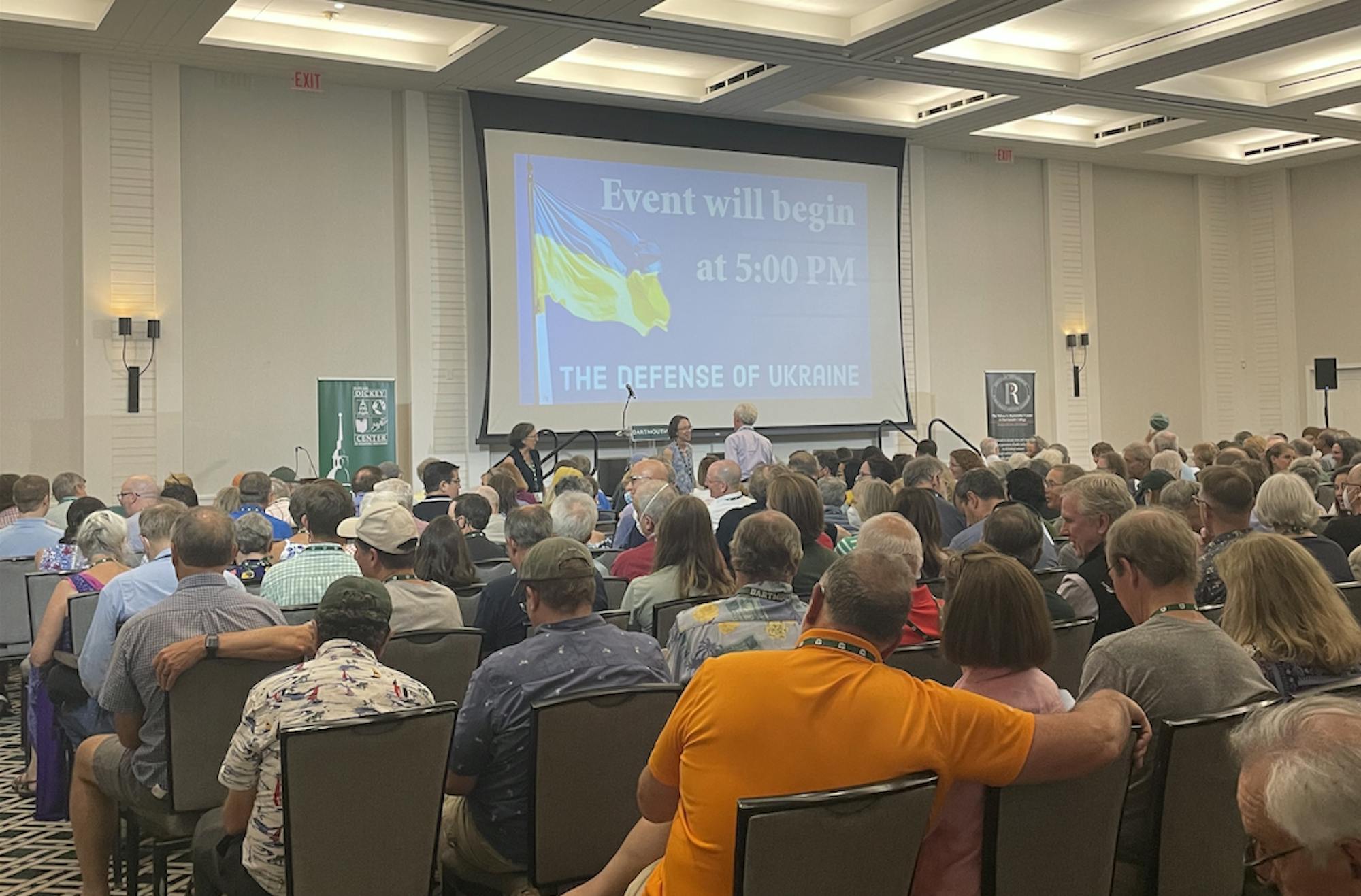The Dickey Center for International Understanding and the Rockefeller Center for Public Policy co-sponsored a bipartisan conversation titled “The Defense of Ukraine” between U.S. senators Rob Portman ’78 (R-Ohio) and Jeanne Shaheen (D-N.H.) on June 17 at Hanover Inn. The event, which was also livestreamed, was attended by approximately 400 local community members, students and alumni visiting the College for reunions. The conversation highlighted the role of Russian disinformation, the United States’ longstanding commitment to Ukraine and the importance of retaining public support for Ukraine.
Both Portman and Shaheen have experience as policymakers in foreign policy and international security issues. Portman serves as co-chair of the bipartisan Senate Ukraine Caucus. He revealed in his talk that he visited Ukraine to meet with Ukrainian President Volodymyr Zelenskyy a month prior to Russia’s invasion. Shaheen serves on the Senate Committee on Foreign Relations — of which Portman is also a member — and chairs one of its subcommittees, the Europe and Regional Security Cooperation.
The talk began with Rockefeller Center director Jason Barabas, who introduced Portman, Shaheen and moderator Victoria Holt, the director of the Dickey Center.
“Both Portman and Shaheen have been active in shaping U.S. policy on Ukraine, including numerous visits to Ukraine ... [and] spearheading billions in security support,” Barabas said in his remarks.
Both senators opened with statements on the war in Ukraine. In her opening comments, Shaheen said she often receives questions on why the Russian invasion of Ukraine matters to New Hampshire residents. Shaheen responded by saying that she is reminded of the importance of rules-based international order and the courage of the Ukrainian people.
“[Putin] refuses to acknowledge that Ukraine is a sovereign nation, much less that it should have its own aspirations to be a democracy with the rest of Europe,” Shaheen said.
Shaheen said that European leaders have expressed concerns about Putin’s next move if he successfully invades Ukraine.
Portman added that there is a global effort to provide assistance to Ukraine.
“Vladimir Putin expected that he would divide [the North Atlantic Treaty Organization] further and really the opposite has happened,” Portman said, citing Sweden and Finland’s application to join NATO.
The conversation with the senators began with a question from Holt about how Americans should handle the consequences of the conflict, such as food insecurity. Shaheen said that Russia is on the offensive by using disinformation to blame the United States for global food insecurity.
“I think that we’ve got to look at where are there opportunities in this dynamic where we can change the tables, turn the tables on Putin and really put him on the defensive,” Shaheen said. She said that so far, the United States and Ukraine have been on the defensive.
Portman said he agreed with Shaheen’s remarks and highlighted the hypocrisy in Russia’s disinformation, as Russians had recently bombed a grain bin near the Black Sea.
“Food should never be used as a weapon of war, and that’s exactly what [the Russians] are doing,” he said.
To combat Russian disinformation, Shaheen proposed having a liaison in charge of coordinating anti-disinformation efforts across federal agencies. Portman said that another way to decrease the effects of disinformation is declassifying “very sensitive, highly classified” information and promoting transparency.
The talk also featured questions from the audience, including one submitted online by a member of the Class of 2021 serving in the Donbas region of Ukraine. The alumnus asked whether Western officials were aware of the shortage of resources such as night-vision goggles and infrared lasers. In response, Portman said that the United States would be providing some additional materials, including longer-range missiles and security vests.
The second audience question was about the goal for Ukraine’s future. Shaheen responded that the goal was to allow Ukraine to determine its own future without international pressure. including from the West. Portman said that Ukrainians should “track their own future.”
Nathan Syvash ’25, a Ukrainian student, attended the talk and said that the war in Ukraine is important to Dartmouth because many students are connected to Ukraine and can impact its future.
“I think that Dartmouth — one of the best colleges in the U.S., if not the world — has to be one of the centers to facilitate that commitment [to Ukraine] because the people, the students who are studying here [...] will help build the future,” he said.
Dagger Bishop ’24 was also in attendance and said he wished the conversation had included international or Ukrainian perspectives.
“I was a little disappointed that it was mainly from a United States point of view, but I can understand that because of the audience,” Bishop said.
The idea for the event originated with Portman, who was visiting Hanover for his class reunion, reaching out to the College about having a conversation on Ukraine, he said in an interview with The Dartmouth. He said he wanted Shaheen to participate in the discussion so that it would be bipartisan.
“This has been an issue unlike many others where it is not broken down on party lines,” Portman said. “It’s an American issue.”




